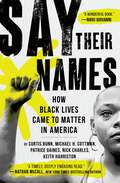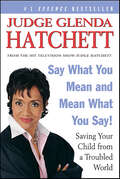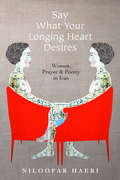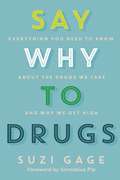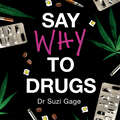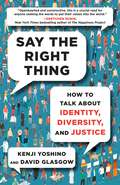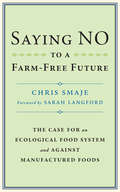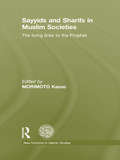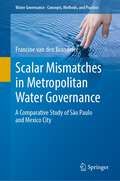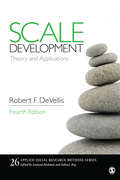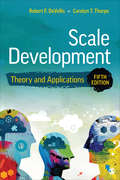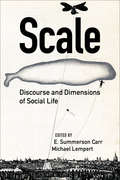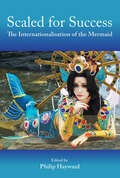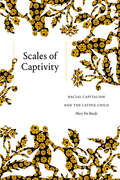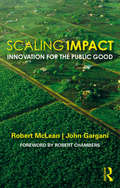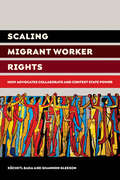- Table View
- List View
Say Their Names: How Black Lives Came to Matter in America
by Patrice Gaines Curtis Bunn Michael H. Cottman Nick Charles Keith HarristonAn incisive, gripping exploration of the forces that pushed our unjust system to its breaking point after the death of George Floyd and a definitive guide to America's present-day racial reckoning. For many, the story of the weeks of protests in the summer of 2020 began with the horrific eight minutes and 46 seconds when Police Officer Derek Chauvin killed George Floyd on camera, and it ended with the sweeping federal, state, and intrapersonal changes that followed. It is a simple story, wherein white America finally witnessed enough brutality to move their collective consciousness. The only problem is that it isn't true. George Floyd was not the first Black man to be killed by police—he wasn&’t even the first to inspire nation-wide protests—yet his death came at a time when America was already at a tipping point. In SAY THEIR NAMES, five seasoned journalists probe this critical shift. With a piercing examination of how inequality has been propagated throughout history, from Black imprisonment and the Convict Leasing program to long-standing predatory medical practices to over-policing, the authors highlight the disparities that have long characterized the dangers of being Black in America. They examine the many moderate attempts to counteract these inequalities, from the modern Civil Rights movement to Ferguson, and how the killings of George Floyd, Breonna Taylor and others pushed compliance with an unjust system to its breaking point. Finally, they outline the momentous changes that have resulted from this movement, while at the same time proposing necessary next steps to move forward. With a combination of penetrating, focused journalism and affecting personal insight, the authors bring together their collective years of reporting, creating a cohesive and comprehensive understanding of racial inequality in America.
Say What You Mean and Mean What You Say!: Saving Your Child from a Troubled World
by Daniel Paisner Glenda HatchettParents have it tough. Kids have it tough, too. And few people are in a better position to guide readers through these tough times than Judge Glenda Hatchett. As chief presiding judge of one of the largest juvenile court systems in the country, she gained a front-row perspective on the hot-button social issues of our time -- including drug and alcohol abuse, truancy, date rape, and school violence. As presiding judge on the hit television series Judge Hatchett, she continues to build bridges between parents and their lost, angry, and alienated teens. And, as a parent, she's turned her professional experiences to personal advantage, helping her own children navigate through some of the more difficult dilemmas facing young people today.Using her experiences as a judge and a parent, Judge Hatchett shares with readers seven simple strategies to becoming more involved in a child's life and maintaining a strong relationship. Including concrete examples and illuminating anecdotes, Judge Hatchett says what she means and means what she says in this essential guide to raising safe, smart, and successful children ... even in the tough times.
Say What Your Longing Heart Desires: Women, Prayer, and Poetry in Iran
by Niloofar HaeriFollowing the 1979 revolution, the Iranian government set out to Islamize society. Muslim piety had to be visible, in personal appearance and in action. Iranians were told to pray, fast, and attend mosques to be true Muslims. The revolution turned questions of what it means to be a true Muslim into a matter of public debate, taken up widely outside the exclusive realm of male clerics and intellectuals. Say What Your Longing Heart Desires offers an elegant ethnography of these debates among a group of educated, middle-class women whose voices are often muted in studies of Islam. Niloofar Haeri follows them in their daily lives as they engage with the classical poetry of Rumi, Hafez, and Saadi, illuminating a long-standing mutual inspiration between prayer and poetry. She recounts how different forms of prayer may transform into dialogues with God, and, in turn, Haeri illuminates the ways in which believers draw on prayer and ritual acts as the emotional and intellectual material through which they think, deliberate, and debate.
Say Why to Drugs: Everything You Need to Know About the Drugs We Take and Why We Get High
by Dr Suzi Gage'Essential' Adam Rutherford, bestselling author of How to Argue With a Racist'In an area where factual accuracy is often rejected in favour of moralising or panicking this book is a vitally useful and frequently fascinating' Robin Ince__________Drugs. We've all done them. Whether it's a cup of coffee or a glass of wine, a cigarette or a sleeping pill. But how well do we understand the effects of the drugs we take - legal or illegal?Say Why to Drugs investigates the science behind recreational drugs- debunking common myths and misconceptions, as well as containing the most recent scientific research. Looking at a range of drugs, this book provides a clear understanding of how drugs work and what they're really doing to your mind and body.Along the way you will find out why ketamine is on the WHO's list of essential medicines, why some researchers hope MDMA could treat PTSD, and much more.Enlightening, entertaining, and thought-provoking, Say Why to Drugs is a compelling read that will surprise and educate proponents on both sides of the drugs debate.__________A definitive and authoritative guide to drugs and why we get high from the creator of the top-rated podcast, Say Why to Drugs.
Say Why to Drugs: Everything You Need to Know About the Drugs We Take and Why We Get High
by Dr Suzi GageA definitive and authoritative guide to drugs and why we get high from the creator of the top-rated podcast, Say Why to Drugs.Drugs. We've all done them. Whether it's a cup of coffee or a glass of wine, a cigarette or a sleeping pill. But how well do we understand the effects of the drugs we take - legal or illegal?Say Why to Drugs investigates the science behind recreational drugs- debunking common myths and misconceptions, as well as containing the most recent scientific research. Looking at a range of drugs, this book provides a clear understanding of how drugs work and what they're really doing to your mind and body. Along the way you will find out why ketamine is on the WHO's list of essential medicines, why some researchers hope MDMA could treat PTSD, and much more.Enlightening, entertaining, and thought-provoking, Say Why to Drugs is a compelling read that will surprise and educate proponents on both sides of the drugs debate.(P)2020 Hodder & Stoughton Limited
Say Why to Drugs: Everything You Need to Know About the Drugs We Take and Why We Get High
by Suzi Gage'Essential' Adam Rutherford, bestselling author of How to Argue With a Racist'In an area where factual accuracy is often rejected in favour of moralising or panicking this book is a vitally useful and frequently fascinating' Robin Ince__________Drugs. We've all done them. Whether it's a cup of coffee or a glass of wine, a cigarette or a sleeping pill. But how well do we understand the effects of the drugs we take - legal or illegal?Say Why to Drugs investigates the science behind recreational drugs- debunking common myths and misconceptions, as well as containing the most recent scientific research. Looking at a range of drugs, this book provides a clear understanding of how drugs work and what they're really doing to your mind and body.Along the way you will find out why ketamine is on the WHO's list of essential medicines, why some researchers hope MDMA could treat PTSD, and much more.Enlightening, entertaining, and thought-provoking, Say Why to Drugs is a compelling read that will surprise and educate proponents on both sides of the drugs debate.__________A definitive and authoritative guide to drugs and why we get high from the creator of the top-rated podcast, Say Why to Drugs.
Say the Right Thing: How to Talk About Identity, Diversity, and Justice
by Kenji Yoshino David GlasgowA Living Now Book Awards Gold Medalist, Social Activism/Charity A practical, shame-free guide for navigating conversations across our differences at a time of rapid social change.In the current period of social and political unrest, conversations about identity are becoming more frequent and more difficult. On subjects like critical race theory, gender equity in the workplace, and LGBTQ-inclusive classrooms, many of us are understandably fearful of saying the wrong thing. That fear can sometimes prevent us from speaking up at all, depriving people from marginalized groups of support and stalling progress toward a more just and inclusive society. Kenji Yoshino and David Glasgow, founders of the Meltzer Center for Diversity, Inclusion, and Belonging at NYU School of Law, are here to show potential allies that these conversations don&’t have to be so overwhelming. Through stories drawn from contexts as varied as social media posts, dinner party conversations, and workplace disputes, they offer seven user-friendly principles that teach skills such as how to avoid common conversational pitfalls, engage in respectful disagreement, offer authentic apologies, and better support people in our lives who experience bias. Research-backed, accessible, and uplifting, Say the Right Thing charts a pathway out of cancel culture toward more meaningful and empathetic dialogue on issues of identity. It also gives us the practical tools to do good in our spheres of influence. Whether managing diverse teams at work, navigating issues of inclusion at college, or challenging biased comments at a family barbecue, Yoshino and Glasgow help us move from unconsciously hurting people to consciously helping them.
Saying NO to a Farm-Free Future: The Case For an Ecological Food System and Against Manufactured Foods
by Chris Smaje“Everyone in the food business needs to read this book. . . . [A] lively and superbly written polemic.”—Joel Salatin, co-founder of Polyface Farm A defense of agroecological, small-scale farming and a robust critique of an industrialized future. One of the few voices to challenge The Guardian's George Monbiot on the future of food and farming (and the restoration of nature) is academic, farmer and author of A Small Farm Future Chris Smaje. In Saying NO to a Farm-Free Future, Smaje presents his defense of small-scale farming and a robust critique of Monbiot’s vision for an urban and industrialized future. Responding to Monbiot’s portrayal of an urban, high-energy, industrially manufactured food future as the answer to our current crises, and its unchallenged acceptance within the environmental discourse, Smaje was compelled to challenge Monbiot’s evidence and conclusions. At the same time, Smaje presents his powerful counterargument – a low-carbon agrarian localism that puts power in the hands of local communities, not high-tech corporates. In the ongoing fight for our food future, this book will help you to understand the difference between a congenial, ecological living and a dystopian, factory-centered existence. A must-read! "Chris Smaje has laid down an indictment – as unremitting as it is undeniable – that cuts through the jargon-filled, techno-worshipping agricultural futurists who promise silver-bullet fixes for having your cake and eating it too. This brilliant and compelling book is at once hopeful and persuasive about the future of food."—Dan Barber, chef at Blue Hill and author of The Third Plate
Saying NO to a Farm-Free Future: The Case For an Ecological Food System and Against Manufactured Foods
by Chris Smaje&“Everyone in the food business needs to read this book. . . . [A] lively and superbly written polemic.&”—Joel Salatin, co-founder of Polyface FarmNamed the Inc. Non-Obvious Book Awards "Best Books of 2023"A defense of agroecological, small-scale farming and a robust critique of an industrialized future.One of the few voices to challenge The Guardian's George Monbiot on the future of food and farming (and the restoration of nature) is academic, farmer and author of A Small Farm Future Chris Smaje. In Saying NO to a Farm-Free Future, Smaje presents his defense of small-scale farming and a robust critique of Monbiot&’s vision for an urban and industrialized future.Responding to Monbiot&’s portrayal of an urban, high-energy, industrially manufactured food future as the answer to our current crises, and its unchallenged acceptance within the environmental discourse, Smaje was compelled to challenge Monbiot&’s evidence and conclusions. At the same time, Smaje presents his powerful counterargument – a low-carbon agrarian localism that puts power in the hands of local communities, not high-tech corporates.In the ongoing fight for our food future, this book will help you to understand the difference between a congenial, ecological living and a dystopian, factory-centered existence. A must-read!"Chris Smaje has laid down an indictment – as unremitting as it is undeniable – that cuts through the jargon-filled, techno-worshipping agricultural futurists who promise silver-bullet fixes for having your cake and eating it too. This brilliant and compelling book is at once hopeful and persuasive about the future of food."—Dan Barber, chef at Blue Hill and author of The Third Plate
Saying No to Hate: Overcoming Antisemitism in America
by Norman H. FinkelsteinSaying No to Hate grounds readers contextually in the history of antisemitism in America by emphasizing the legal, political, educational, communal, and other strategies American Jews have used through the centuries to address high-profile threats. Norman H. Finkelstein shows how antisemitism has long functioned in America in systemic, structural, and interpersonal ways, from missionaries, the KKK, and American Nazis to employment discrimination, social media attacks, and QAnon. He explains how historic antisemitic events such as General Ulysses S. Grant&’s General Order No. 11 (1862); the Massena, New York blood libel (1928); and the mass shooting at the Tree of Life synagogue (2018) galvanized the Jewish community. Finkelstein shines light on Jews such as Louis Brandeis and Admiral Hyman Rickover who succeeded despite discrimination and on individuals and organizations that have tackled legal and security affairs, from the passage of Maryland&’s Jew Bill (1826) to groups helping Jewish institutions better protect themselves from active shooter threats. Far from a victim narrative, Saying No to Hate is as much about Jewish resilience and ingenuity as it is about hatred. Engaging high school students and adults with personal narratives, it prepares each of us to recognize, understand, and confront injustice and hatred today, in the Jewish community and beyond.
Sayonara Amerika, Sayonara Nippon: A Geopolitical Prehistory of J-Pop (Asia Perspectives: History, Society, and Culture)
by Michael BourdaghsFrom the beginning of the American Occupation in 1945 to the post-bubble period of the early 1990s, popular music provided Japanese listeners with a much-needed release, channeling their desires, fears, and frustrations into a pleasurable and fluid art. Pop music allowed Japanese artists and audiences to assume various identities, reflecting the country's uncomfortable position under American hegemony and its uncertainty within ever-shifting geopolitical realities. In the first English-language study of this phenomenon, Michael K. Bourdaghs considers genres as diverse as boogie-woogie, rockabilly, enka, 1960s rock and roll, 1970s new music, folk, and techno-pop. Reading these forms and their cultural import through music, literary, and cultural theory, he introduces readers to the sensual moods and meanings of modern Japan. As he unpacks the complexities of popular music production and consumption, Bourdaghs interprets Japan as it worked through (or tried to forget) its imperial past. These efforts grew even murkier as Japanese pop migrated to the nation's former colonies. In postwar Japan, pop music both accelerated and protested the commodification of everyday life, challenged and reproduced gender hierarchies, and insisted on the uniqueness of a national culture, even as it participated in an increasingly integrated global marketplace. Each chapter in Sayonara Amerika, Sayonara Nippon examines a single genre through a particular theoretical lens: the relation of music to liberation; the influence of cultural mapping on musical appreciation; the role of translation in transmitting musical genres around the globe; the place of noise in music and its relation to historical change; the tenuous connection between ideologies of authenticity and imitation; the link between commercial success and artistic integrity; and the function of melodrama. Bourdaghs concludes with a look at recent Japanese pop music culture.
Sayyids and Sharifs in Muslim Societies: The Living Links to the Prophet (New Horizons in Islamic Studies)
by Morimoto KazuoThe global Muslim population includes a large number of lineal descendants and relatives of the Prophet Muhammad. These kinsfolk, most often known as "sayyid" or "sharif," form a distinct social category in many Muslim societies, and their status can afford them special treatment in legal matters and in the political sphere. This book brings together an international group of renowned scholars to provide a comprehensive examination of the place of the kinsfolk of Muhammad in Muslim societies, throughout history and in a number of different local manifestations. The chapters cover: how the status and privileges of sayyids and sharifs have been discussed by religious scholars how the prophetic descent of sayyids and sharifs has functioned as a symbolic capital in different settings the lives of actual sayyids and sharifs in different times and places Providing a thorough analysis of sayyids and sharifs from the ninth century to the present day, and from the Iberian Peninsula to the Indonesian Archipelago, this book will be of great interest to scholars of Islamic studies, Middle East and Asian studies.
Scala Radio's A Soundtrack for Life: Classical Music to Take You Through the Day
by Scala RadioBringing together much-loved masterpieces with exciting new works, this accessible and inspiring guide is a celebration of classical music. With pieces ranging from Vaughan Williams's The Lark Ascending and Beethoven's Pastoral Symphony to the scores for Avatar and Assassin's Creed, each entry puts the piece of music into context, providing fascinating insights into the inspirations behind each work and enhancing your listening experience. Organised into Occasions and Themes, the book features music to accompany you through your day, from getting up and getting dressed to running, reading, walking the dog, cooking, taking a bath, going to sleep and everything in between. You'll also find expert curations of the world's most romantic music and the greatest Christmas choral works as well as compositions that celebrate the natural world and mark births and marriages. Perfect for classical music enthusiasts as well as anyone looking for an enjoyable introduction to this genre, this is the definitive modern guide to classical music.
Scala Radio's A Soundtrack for Life: Classical Music to Take You Through the Day
by Scala RadioBringing together much-loved masterpieces with exciting new works, this accessible and inspiring guide is a celebration of classical music. With pieces ranging from Vaughan Williams's The Lark Ascending and Beethoven's Pastoral Symphony to the scores for Avatar and Assassin's Creed, each entry puts the piece of music into context, providing fascinating insights into the inspirations behind each work and enhancing your listening experience. Organised into Occasions and Themes, the book features music to accompany you through your day, from getting up and getting dressed to running, reading, walking the dog, cooking, taking a bath, going to sleep and everything in between. You'll also find expert curations of the world's most romantic music and the greatest Christmas choral works as well as compositions that celebrate the natural world and mark births and marriages. Perfect for classical music enthusiasts as well as anyone looking for an enjoyable introduction to this genre, this is the definitive modern guide to classical music.
Scalar Mismatches in Metropolitan Water Governance: A Comparative Study of São Paulo and Mexico City (Water Governance - Concepts, Methods, and Practice)
by Francine van den BrandelerThe book provides insights into the particular nature of water-related challenges in metropolitan regions of the Global South and the “scalar mismatches” that prevent their sustainable and inclusive development. It argues for the adoption of a metropolitan water governance approach to assess these challenges, including the drivers and institutions that shape these, and the policy instruments at river basin and urban scales that aim to address these. The cases of Mexico City and São Paulo, as two mega-cities with a wide ranging of water-related challenges, present lessons to other fast growing urban agglomerations on the variety of possible responses as well as obstacles to their effectiveness that receive little attention.
Scale
by Andrew HerodGeographical scale is a central concept enabling us to make sense of the world we inhabit. Amongst other things, it allows us to declare one event or process a national one and another a global or regional one. However, geographical scales and how we think about them are profoundly contested, and the spatial resolution at which social processes take place – local, regional or global – together with how we talk about them has significant implications for understanding our world. Scale provides a structured investigation of the debates concerning the concept of scale and how various geographical scales have been thought about within critical social theory. Specifically, the author examines how the scales of the body, the urban, the regional, the national, and the global have been conceptualized within Geography and the social sciences more broadly. The first part of the book provides a comprehensive overview of how different theoretical perspectives have regarded scale, especially debates over whether scales are real things or merely mental contrivances and/ or logical devices with which to think, as well as the consequences of thinking of them in areal versus in networked terms. The subsequent five chapters of the book then each takes a particular scale: the body; the urban; the regional; the national; the global and explores how it has been conceptualized and represented discursively for political and other purposes. A brief conclusion draws the book together by posing a number of questions about scale which emerge from the foregoing discussion. The first single-author volume ever written on the subject of geographical scale, this book provides a unique overview in pushing understandings of scale in new and original directions. The accessible text is complimented by didactic boxes, and Scale serves as a valuable pedagogical reference for undergraduate and postgraduate audiences wishing to become familiar with such theoretical issues.
Scale Development: Theory and Applications (Applied Social Research Methods #26)
by Dr Robert F. DeVellisIn the Fourth Edition of Scale Development, Robert F. DeVellis demystifies measurement by emphasizing a logical rather than strictly mathematical understanding of concepts. The text supports readers in comprehending newer approaches to measurement, comparing them to classical approaches, and grasping more clearly the relative merits of each. This edition addresses new topics pertinent to modern measurement approaches and includes additional exercises and topics for class discussion.
Scale Development: Theory and Applications (Applied Social Research Methods #26)
by Dr Robert F. DeVellisIn the Fourth Edition of Scale Development, Robert F. DeVellis demystifies measurement by emphasizing a logical rather than strictly mathematical understanding of concepts. The text supports readers in comprehending newer approaches to measurement, comparing them to classical approaches, and grasping more clearly the relative merits of each. This edition addresses new topics pertinent to modern measurement approaches and includes additional exercises and topics for class discussion.
Scale Development: Theory and Applications (Applied Social Research Methods)
by Robert F. DeVellis Carolyn T. ThorpeScale Development: Theory and Applications, by Robert F. DeVellis and new co-author Carolyn T. Thorpe, demystifies measurement by emphasizing a logical rather than strictly mathematical understanding of concepts. The Fifth Edition includes a new chapter that lays out the key concepts that distinguish indices from scales, contrasts various types of indices, suggests approaches for developing them, reviews validity and reliability issues, and discusses in broad terms some analytic approaches. All chapters have been updated, and the book strikes a balance between including relevant topics and highlighting recent developments in measurement while retaining an accessible, user-friendly approach to the material covered.
Scale Development: Theory and Applications (Applied Social Research Methods)
by Robert F. DeVellis Carolyn T. ThorpeScale Development: Theory and Applications, by Robert F. DeVellis and new co-author Carolyn T. Thorpe, demystifies measurement by emphasizing a logical rather than strictly mathematical understanding of concepts. The Fifth Edition includes a new chapter that lays out the key concepts that distinguish indices from scales, contrasts various types of indices, suggests approaches for developing them, reviews validity and reliability issues, and discusses in broad terms some analytic approaches. All chapters have been updated, and the book strikes a balance between including relevant topics and highlighting recent developments in measurement while retaining an accessible, user-friendly approach to the material covered.
Scale: Discourse and Dimensions of Social Life
by E. Summerson CarrA free ebook version of this title is available through Luminos, University of California Press's new open access publishing program. Visit www.luminosoa.org to learn more. Wherever we turn, we see diverse things scaled for us, from cities to economies, from history to love. We know scale by many names and through many familiar antinomies: local and global,micro and macroevents to name a few. Even the most critical among us often proceed with our analysis as if such scales were the ready-made platforms of social life, rather than asking how, why, and to what effect are scalar distinctions forged in the first place. How do scalar distinctions help actors and analysts alike make sense of and navigate their social worlds? What do these distinctions reveal and what do they conceal? How are scales construed and what effects do they have on the way those who abide by them think and act? This pathbreaking volume attends to the practical labor of scale-making and the communicative practices this labor requires. From an ethnographic perspective, the authors demonstrate that scale is practice and process before it becomes product, whether in the work of projecting the commons, claiming access to the big picture, or scaling the seriousness of a crime.
Scaled for Success: The Internationalisation of the Mermaid
by Philip Hayward“This wonderful book asks us to consider the mermaid . . . across regions, nations, diasporas, and contemporary socio-cultural configurations.” —Paige West, Claire Tow Professor of Anthropology, Barnard College, Columbia UniversityEmerging from the confluence of Greco-Roman mythology and regional folklore, the mermaid has been an enduring motif in Western culture since the medieval period. It has also been disseminated more widely, initially through Western trade and colonization and, more recently, through the increasing globalization of media products and outlets.Scaled for Success offers the first detailed overview of the mermaid’s dispersal outside Europe. Complementing previous studies of the interrelationship between the mermaid and Mami Wata spirit in West Africa, this volume addresses the mermaid’s presence in a range of Middle Eastern, Asian, Australian, Latin American and North American contexts. Individual chapters identify the manner in which the mermaid has been variously syncretized and/or resignified in contexts as diverse as Indian public statuary, Thai cinema and Coney Islands annual Mermaid Parade.Rather than lingering as a relic of a bygone age, the mermaid emerges as a versatile, dynamic and, above all, polyvalent figure. Her prominence exemplifies the manner in which contemporary media-lore has extended the currency of established folkloric figures in new and often surprising ways. Analyzing aspects of religious symbolism, visual art, literature and contemporary popular culture, this copiously illustrated volume profiles an intriguing and highly diverse phenomenon.“No matter the reader’s background (literature, folklore, media or cultural studies, and beyond), there is no denying that this work will be a valuable addition to the library of anyone fascinated with mermaids.” —Western Folklore
Scales of Captivity: Racial Capitalism and the Latinx Child
by Mary Pat BradyIn Scales of Captivity, Mary Pat Brady traces the figure of the captive or cast-off child in Latinx and Chicanx literature and art between chattel slavery’s final years and the mass deportations of the twenty-first century. She shows how Latinx expressive practices expose how every rescaling of economic and military power requires new modalities of capture, new ways to bracket and hedge life. Through readings of novels by Helena María Viramontes, Oscar Casares, Lorraine López, Maceo Montoya, Reyna Grande, Daniel Peña, and others, Brady illustrates how submerged captivities reveal the way mechanisms of constraint such as deportability ground institutional forms of carceral modernity and how such practices scale relations by naturalizing the logic of scalar hierarchies underpinning racial capitalism. By showing how representations of the captive child critique the entrenched logic undergirding colonial power, Brady challenges racialized modes of citizenship while offering visions for living beyond borders.
Scaling Impact: Innovation for the Public Good
by Robert McLean John GarganiScaling Impact introduces a new and practical approach to scaling the positive impacts of research and innovation. Inspired by leading scientific and entrepreneurial innovators from across Africa, Asia, the Caribbean, Latin America, and the Middle East, this book presents a synthesis of unrivalled diversity and grounded ingenuity. The result is a different perspective on how to achieve impact that matters, and an important challenge to the predominant more-is-better paradigm of scaling. For organisations and individuals working to change the world for the better, scaling impact is a common goal and a well-founded aim. The world is changing rapidly, and seemingly intractable problems like environmental degradation or accelerating inequality press us to do better for each other and our environment as a global community. Challenges like these appear to demand a significant scale of action, and here the authors argue that a more creative and critical approach to scaling is both possible and essential. To encourage uptake and co-development, the authors present actionable principles that can help organisations and innovators design, manage, and evaluate scaling strategies. Scaling Impact is essential reading for development and innovation practitioners and professionals, but also for researchers, students, evaluators, and policymakers with a desire to spark meaningful change.
Scaling Migrant Worker Rights: How Advocates Collaborate and Contest State Power
by Shannon GleesonA free ebook version of this title is available through Luminos, University of California Press’s Open Access publishing program. Visit www.luminosoa.org to learn more. As international migration continues to rise, sending states play an integral part in "managing" their diasporas, in some cases even stepping in to protect their citizens' labor and human rights in receiving states. At the same time, meso-level institutions—including labor unions, worker centers, legal aid groups, and other immigrant advocates—are among the most visible actors holding governments of immigrant destinations accountable at the local level. The potential for a functional immigrant worker rights regime, therefore, advocates to imagine a portable, universal system of justice and human rights, while simultaneously leaning on the bureaucratic minutiae of local enforcement. Taking Mexico and the United States as entry points, Scaling Migrant Worker Rights analyzes how an array of organizations put tactical pressure on government bureaucracies to holistically defend migrant rights. The result is a nuanced, multilayered picture of the impediments to and potential realization of migrant worker rights.
